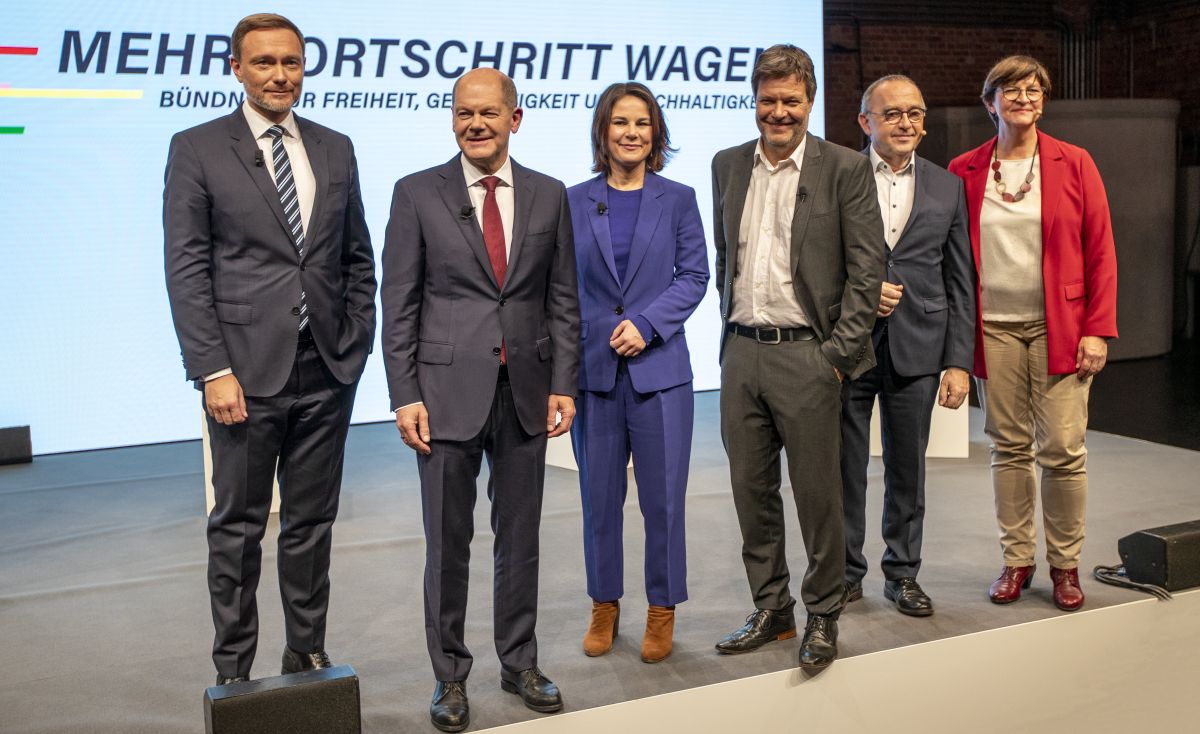The New German Government's European Policy
In the coalition agreement unveiled on 24 November, the Social Democrats, Liberals, and Greens express resolute support for closer European integration. The new government will likely be more active than outgoing Chancellor Angela Merkel’s cabinet in initiating and shaping community decisions. The coalition announced ambitious climate policy and support for boosting the EU’s strategic sovereignty and establishing new sources of revenue. The prospect for a deal between the Union’s northern and southern members on reform of fiscal rules has improved.
 Fot: Andreas Gora / ddp images / Forum
Fot: Andreas Gora / ddp images / Forum
Olaf Scholz, a Social Democrat and former minister of finance, will become chancellor. His former portfolio will be taken over by the leader of the Liberals, Christian Lindner. The Greens will head several ministries important for EU policy: foreign affairs, economy and climate, and agriculture.
Fiscal Rules and Budget
Even though the ministry of finance will go to the fiscally conservative FDP, the content of the agreement leaves some room for compromise on the reform of EU fiscal rules and readiness to accommodate the pleas of Southern European members. The coalition trio claim that the rules should not only prevent Member States from running excessive debts but also create favourable conditions for growth and green investments. This suggests that the new government could accept a slower pace of reduction of the South’s substantial debts.
Advocates of closer integration believe that the agreement leaves open the possibility to resort to common debt again in the future. Although the Next Generation EU recovery fund (NGEU) is described as a temporary instrument, another similar undertaking has not been excluded. Its purpose could be to maintain funding for the green and digital transitions once the NGEU money runs out (the latter is to be transferred to Member States in tranches until the end of 2023 and spent by the end of 2026). In addition, the agreement stresses that repayment of the debt incurred to create NGEU must not lead to a reduction of the community budget. Therefore Scholz’s government can be expected to advocate swift adoption of new sources of revenue for the EU.
Climate
At the country level, the coalition trio intends to speed up the development of renewables and bring the coal phase-out forward. These commitments suggest that the new government will display a similarly ambitious approach in the negotiations of the Union’s “Fit for 55” package. The coalition announced support for including fuels used in transport and heating of buildings in the EU emission trading system. It also suggested establishing a price floor for emissions within the system. The government will also insist that all EU trade deals contain binding and enforceable clauses on climate and environment protection.
Common Foreign and Security Policy
While stressing the responsibility of Germany for Europe and the world, the coalition partners signalled a more active foreign policy and a commitment to strengthening its European dimension. They also proclaim a more principled approach. Human rights are to be an important reference, in particular in relations with China and Russia, while preserving democracy was included among “the most important challenges of our times” along with the green and digital transitions. However, the three parties also stress their readiness to cooperate with both powers. China was described as a partner, competitor, and systemic rival which mirrored the approach presented by the European Commission (EC) in 2019. The trio also stressed that policy towards this country will be shaped on the basis of transatlantic consultations. The coalition forces believe that ratification of the investment deal, concluded last December under pressure from Germany, is not possible at present, which marks a clear change of stance. Meanwhile, consideration of the interests of Central and Eastern European states was mentioned among the factors that will have an effect on Russia policy.
The new government indicated that to strengthen the EU’s position in world affairs it must continue to enhance its strategic sovereignty (in the agreement, this term is used instead of “autonomy”, featured in EU documents). It is perceived by the coalition trio chiefly as strengthening the Union’s capabilities and self-sufficiency in such domains as health, energy, digital technologies, and raw materials.
The coalition parties welcome closer cooperation between Member States on defence (including development of capabilities, training, and common missions). Yet, they emphasised that complementarity and interoperability of EU structures with NATO forces should be maintained.
Migration
The coalition deal states that reform of EU asylum policy is necessary. The new government will be ready to proceed with a coalition of the willing in this area, as not all Member States accept quotas of asylum seekers. Agreements with countries of origin will constitute an important element of migration policy. The coalition parties believe such arrangements will lead to improved control of migration flows and will make the Union more resistant to blackmail by third parties who use migrants to gain concessions from the community. The coalition parties vowed to eliminate situations in which migrants’ rights are breached at EU borders through pushbacks.
Institutional Issues and Rule of Law
The coalition trio stated that creation of a European federal state, decentralised and based on subsidiarity, should be the long-term goal of the integration process. In order to achieve this aim, treaty change is necessary. Therefore the Conference on the future of Europe should become a constitutional convention. Ideas for institutional reforms mentioned in the agreement include pleas that have been made by the federalist camp for several years: replacing unanimity with qualified majority voting, establishing pan-European lists in European elections, and electing the Commission president through the spitzenkandidaten mechanism.
The trio urged the EC to be more tenacious in using the legal instruments designed to protect rule of law in the EU, including the conditionality mechanism through which EU funds could be reduced if states are found to breach the rule of law. They also emphasised that the new government would not accept granting NGEU funds to Member States accused by the EC of infringing the independence of the judiciary.
Conclusions
Even though there is no indication of a radical shift, some elements of the coalition agreement constitute a departure from the policy of Merkel’s government. As regards the future of Europe, the commitment to gradual changes will be replaced by a resolute push for deeper integration. A more flexible position on fiscal rules could contribute to breaking the deadlock on this issue—crucial for the economic future of the Union. In external relations, the coalition trio plans a more assertive promotion of EU values and goals as regards human rights and sustainable development, but also economic standards (trade, digital technologies). This signals a somewhat different approach than Merkel’s, which has been criticised as excessively focused on economic gains and lenient with authoritarian leaders.
The intentions of the incoming government, including the commitment to the green and digital transitions and to strengthening strategic autonomy, accord with the key objectives of the Commission. Prospects for cooperation within the Franco-German tandem are promising, too, although President Emmanuel Macron could be disappointed by the German reticence to boost EU autonomy in the area of defence.
The likelihood of institutional changes is limited as they need unanimous support from EU members. The proposal to consider treaty change will probably be approved but the majority of countries will insist that government representatives be granted a central role in this process.
Several elements of the coalition agreement correspond with the Polish stance: opposition to a reduction of the future multiannual budget, a commitment to defend multilateralism in close cooperation with the U.S., and a conviction that NATO remains the cornerstone of European security. However, the Polish government rejects institutional changes advocated by the trio. As regards rule of law, opinions spelled out in the agreement limit the likelihood of Poland getting the approval of the Commission and the Council to access the recovery fund without changes to the judiciary that would be in line with judgments of the Court of Justice of the EU. Poland can assume that Scholz’s government will be amenable to boosting EU support for states that still strongly rely on fossil fuels and where the implementation of the “Fit for 55” package can entail significant social costs. Yet, using EU funds to finance nuclear energy could become a bone of contention, as it is opposed by the current German government and the new coalition. Finally, even though the Greens and FDP criticised the Nord Stream 2 pipeline, the absence of this issue from the agreement suggests that the government will not attempt to block this project.


